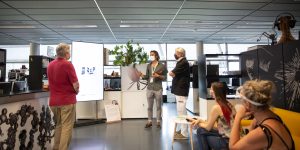Nicolas Naveau
-
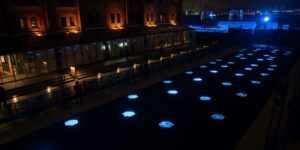
Stream of Hope
Large-Scale Fluxel Performance in Japan
Ars Electronica Futurelab’s Fluxels, a scalable swarm of ground robots equipped with hexagonal LED displays, brought about a new language of visual expression. Stream of Hope in Osaka and Yokohama showcased their versatility at large-scale events.
-
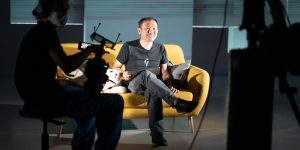
Artistic Journalism 2021
Online Course on Social Dialogue
In 2021, Ars Electronica Futurelab’s Artistic Director Hideaki Ogawa taught an online course at Keio University SFC (Shonan Fujisawa Campus) on “Artistic Journalism”: the act of creating a social dialogue through artistic expression, research, exploration, and action.
-
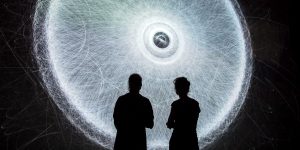
Resonant Media
Exhibition on the Possibilities of 8K Visualization
“Resonant Media – Possibilities of 8K Visualization” took an artistic and scientific approach to explore the new possibilities of 8K from diverse perspectives. The exhibition in Tokyo in 2021 presented a diverse range of projects that explored the future of 8K beyond the existing frame.
-
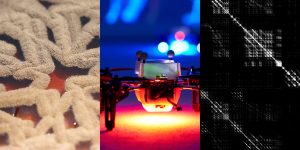
Future Ink
In Creativity, Where Is My Soul?
The Future Ink Project is a research project to explore the future of creativity from all aspects of ink. Various prototypes were developed in the course of Future Ink, from using tablets and drones to paint to visualizing brainwaves and body signals as immersive three-dimensional ink.
-
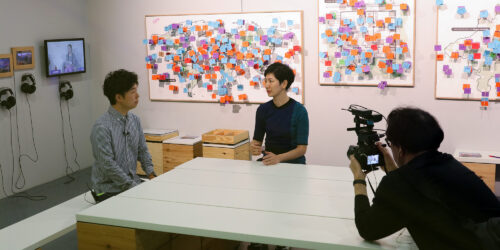
Art Thinking Initiative
Ars Electronica x Hakuhodo
Art Thinking Initiative (ATI) is a joint consulting program between Hakuhodo and Ars Electronica Futurelab to incorporate the method of Art Thinking into the management and R&D of companies, research institutions, and government organizations. Hakuhodo is a leading communication design and marketing solutions company in Japan with its core philosophy centered on People Thinking. Since…
-

Artistic Journalism
Artistic journalism is the act of creating a social dialogue through artistic expression, research, exploration, and action. To engage students in this method, Ars Electronica Futurelab co-director Hideaki Ogawa has been teaching “Artistic Journalism” online courses at Keio University SFC (Shonan Fujisawa Campus).
-
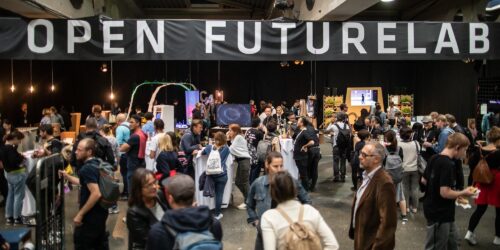
Open Futurelab 2019
The festival site at POSTCITY in Linz was used as a stage for Open Futurelab until 2019. Created with the Japanese public broadcasting company NHK, Media Platz was a prototype of an open media plaza consisting of cardboard and high-resolution screens, which was used as a forum for public debate. Various panel discussions took place…
-
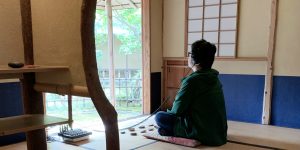
Future Citizen
Matsudo International Science Art Festival 2019
From November 16th to 17th 2019, the Ars Electronica Futurelab contributed to the International Science Art Festival in Matsudo, Japan, for the second time – with an “Ars Electronica Salon” on the theme of “Future Citizen”.
-
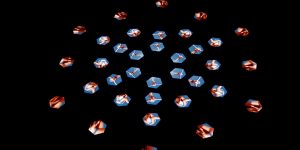
Swarm Arena @Miraikan
In the beginning, there was a shared research interest: How can swarm-based technology be embedded in everyday media use and what new possibilities of communication or artistic expression does it offer as a visual medium? The Japanese telecommunications company NTT and the Ars Electronica Futurelab have been investigating these questions since 2017 and have repeatedly…
-

Jobs of the future in an automated mobility environment
What does our road traffic look like when automation becomes reality? How does a traffic policewoman work in a world where cars drive themselves? What does a driving instructor do when you no longer need a driver’s license?
-

Beyond the Frame – 8K Future Projects
Since 2018, together with Japan’s largest public broadcaster NHK, the Ars Electronica Futurelab has been pursuing questions about the future of the next generation of 8K ultra-high definition TV technology. As early as 2016, NHK began producing 8K material, developing recording and playback technology, and launched the first 8K single channel, making it one of…
